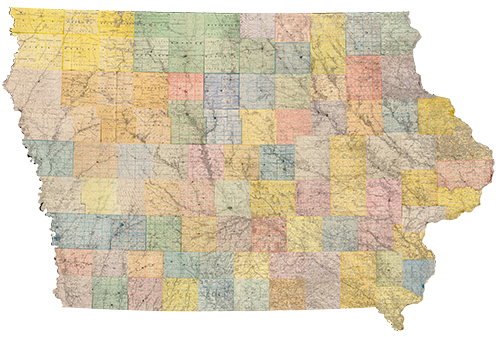Impassable Roads in Chickasaw County and the Rains of 1858
New Hampton, Chickasaw County, Iowa
Spirited storyteller J.H. Powers tells of the summer when “it rained almost continuously.” Apparently the summer of 1858 produced rains that turned little streams into rivers. Powers tells of one day when he, another man, and two women wanted to travel from New Hampton to Jacksonville. They “took passage in a lumber wagon drawn by a yoke of oxen.” When they reached Plumb Creek, they found it overflown and thought to ford the swollen creek. But when the front wheels of the wagon “dropped into the channel of the stream [and] the chain came loose that attached the oxen to the wagon,” the oxen became separated from the wagon and its passengers. It was determined that the passengers should wade ashore, lessening the wagon’s weight in hopes that the wagon could be reattached to the team of oxen. Each man proposed to carry one of the women ashore, but Powers slipped plunging himself and his passenger into the cold water. Each, singly, waded ashore.
That summer one did not have to leave New Hampton to find herself or himself immersed in mud. Powers remembers that the season was so wet that “the stage mired down with four horses, right in the middle of Main street [in New Hampton] and it took a team of six yoke of oxen to draw it out.” He continues, “Probably no team traversed the ground between Forest City and New Hampton during the summer of 1858 without being sloughed down, and a set of ropes were kept at New Hampton with which to draw out teams mired down in trying to reach that place. It became so bad on the stage road between Bradford and Fredericksburg that A.V. Allen built a big flat scow large enough to take the stage, and hitching on eight yoke of oxen—this being his breaking team—took it over from his place to Tingley’s.” Powers claims, “I have seen the whole four stage horses mired down on main street in Forest city. I have also seen teams mired down on main street in New Hampton.”

Although the financial panic of 1857 meant that all merchants in Jacksonville Township went under and that the price of wheat collapsed throwing some farmers’ families into near starvation conditions, from the distance of 1894, Mr. Powers remembers the wet summer of 1858 without these sobering details. He admits his is not an official history of the county.
Sources: SHSI: J.H. Powers, Historical and Reminiscences of Chickasaw County, Iowa. Des Moines, 1894; W.E. Alexander, History of Chickasaw and Howard Counties, Iowa, Decorah, 1883.
